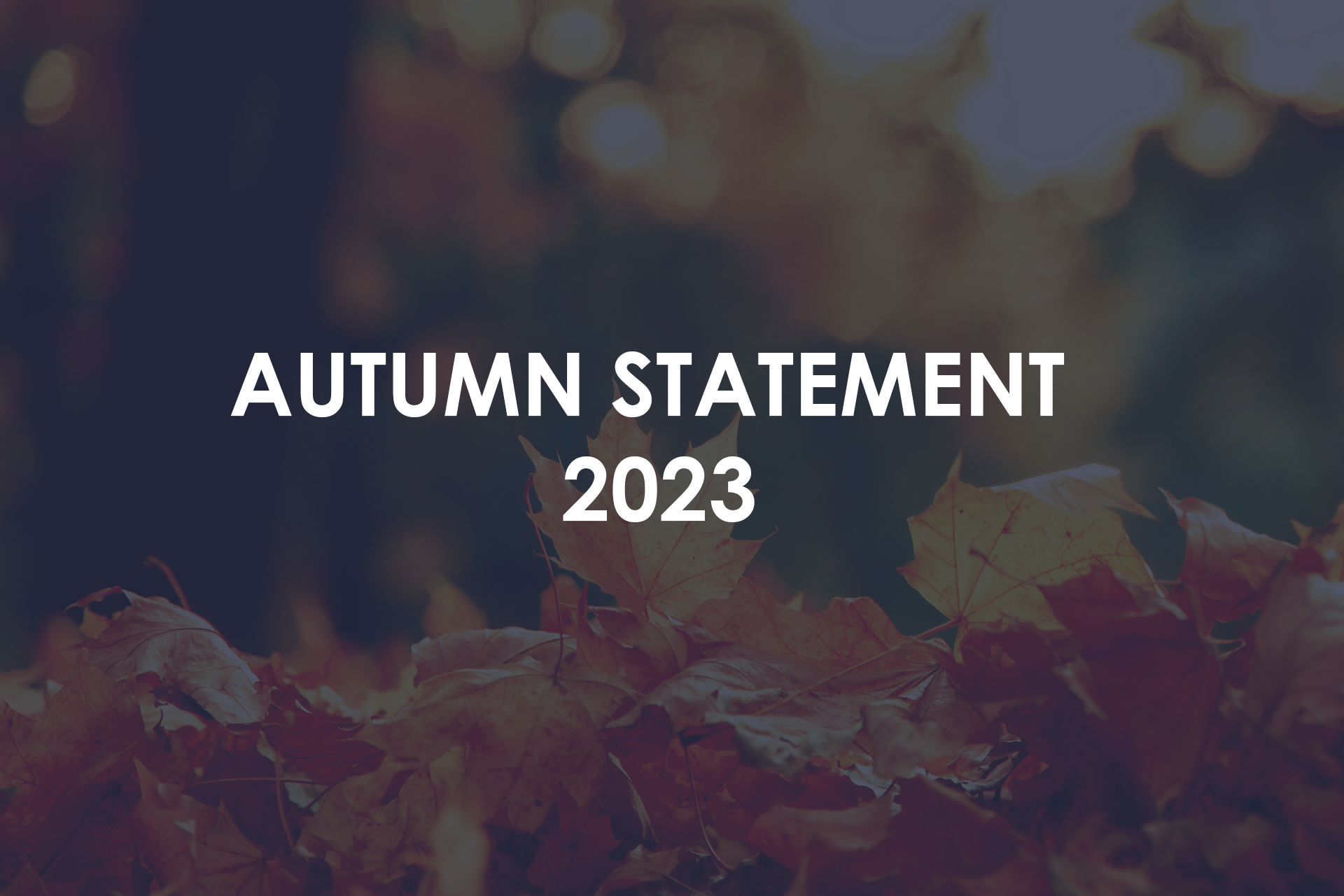Against a backdrop of reducing inflation and greater headroom for spending, the Chancellor announced several tax cuts and boosts to business in his ‘Autumn Statement for Growth’
Headlines
- Class 2 National Insurance contributions (NICs) will be abolished and the main rate of Class 4 NICs will reduce from 9% to 8% from 6 April 2024.
- Full Expensing for companies will be made permanent.
- The R&D Expenditure Credit (RDEC) and SME schemes will be merged into a single scheme from 1 April 2024.
- The qualifying period for Investment Zone and Freeport benefits will be doubled from five to ten years.
- The main rate of Class 1 employee NICs will reduce from 12% to 10% from 6 January 2024.
Personal taxation
The main rate of Class 1 employee NICs, which is payable on earnings between £12,570 and £50,270, will be cut from 12% to 10% from 6 January 2024. For the average worker earning £35,400 this should result in a tax cut for 2024/25 of over £450.
The Van Benefit Charge and the Car and Van Fuel Benefit Charges will be frozen at 2023/24 levels for 2024/25.
The government is making changes to simplify ISAs and provide more choice, including expanding the investment opportunities available in ISAs to include Long-Term Asset Funds and open-ended property funds with extended notice periods. The limits will be frozen at their current levels for 2024/25.
Individuals whose income is wholly taxed through Pay As You Earn will no longer need to file a Self Assessment tax return from 2024/25. This should remove the requirement for up to 338,000 taxpayers to submit a return.
The Van Benefit Charge and the Car and Van Fuel Benefit Charges will be frozen at 2023/24 levels for 2024/25.
The government is making changes to simplify ISAs and provide more choice, including expanding the investment opportunities available in ISAs to include Long-Term Asset Funds and open-ended property funds with extended notice periods. The limits will be frozen at their current levels for 2024/25.
Individuals whose income is wholly taxed through Pay As You Earn will no longer need to file a Self Assessment tax return from 2024/25. This should remove the requirement for up to 338,000 taxpayers to submit a return.
Self-employed individuals
Several measures were announced which benefit self-employed individuals. The main rate of Class 4 NICs payable on self-employed profits between £12,570 and £50,270 will be reduced from 9% to 8% from 6 April 2024. In addition, Class 2 NICs payable by self-employed individuals with profits in excess of £12,570 will be abolished from 6 April 2024.
Further reforms to Class 2 NIC are expected for those lower paid self-employed individuals who currently pay voluntary contributions.
The cash basis of accounting will become the default method for businesses from 2024/25. The turnover, interest and loss relief restrictions that currently apply to the cash basis will be removed.
Making Tax Digital (MTD) for Income Tax Self
Assessment will be simplified. This is expected to benefit approximately 1.7 million businesses and landlords.
HMRC will also rewrite guidance around the tax deductibility of training costs for sole traders and the self-employed to provide more clarity to businesses on what costs are deductible.
COMMENT - Changes to self-employed NICs are expected to benefit around two million self-employed individuals and will result in an average self-employed person on £28,200 saving £350 in 2024/25.
Further reforms to Class 2 NIC are expected for those lower paid self-employed individuals who currently pay voluntary contributions.
The cash basis of accounting will become the default method for businesses from 2024/25. The turnover, interest and loss relief restrictions that currently apply to the cash basis will be removed.
Making Tax Digital (MTD) for Income Tax Self
Assessment will be simplified. This is expected to benefit approximately 1.7 million businesses and landlords.
HMRC will also rewrite guidance around the tax deductibility of training costs for sole traders and the self-employed to provide more clarity to businesses on what costs are deductible.
COMMENT - Changes to self-employed NICs are expected to benefit around two million self-employed individuals and will result in an average self-employed person on £28,200 saving £350 in 2024/25.
Capital allowances
Full Expensing, whereby companies are eligible for a 100% First Year Allowance (FYA) on qualifying main pool assets and a 50% FYA on special rate pool assets, has been made permanent. This relief was previously expected to cease on 31 March 2026. This is expected to increase business investment by £3 billion per year according to the Office for Budget Responsibility (OBR).
A technical consultation will also be launched on wider changes to simplify the UK’s capital allowances legislation.
A technical consultation will also be launched on wider changes to simplify the UK’s capital allowances legislation.
Research and Development (R&D) relief
Following consultation, the R&D Expenditure Credit (RDEC) and SME schemes will be merged into a single scheme for expenditure incurred in accounting periods beginning on or after 1 April 2024. The rate under the merged scheme will be set at the current RDEC rate of 20%.
The notional tax rate applied to loss-making companies within the merged scheme will be reduced from 25% to 19%.
The threshold for a company to be considered R&D intensive (and therefore benefit from an enhanced rate of relief) will be reduced from 40% to 30% for accounting periods starting on or after 1 April 2024 which is expected to allow around 5,000 extra SMEs to benefit. A one-year grace period will also be introduced where companies dip under the 30% threshold.
COMMENT - The R&D changes will provide £280 million of additional relief per year by 2028/29 to help drive innovation in the UK.
The notional tax rate applied to loss-making companies within the merged scheme will be reduced from 25% to 19%.
The threshold for a company to be considered R&D intensive (and therefore benefit from an enhanced rate of relief) will be reduced from 40% to 30% for accounting periods starting on or after 1 April 2024 which is expected to allow around 5,000 extra SMEs to benefit. A one-year grace period will also be introduced where companies dip under the 30% threshold.
COMMENT - The R&D changes will provide £280 million of additional relief per year by 2028/29 to help drive innovation in the UK.
Freeports and Investment Zones
The Investment Zones programme and Freeport tax reliefs will be extended from five to ten years.
Three more Investment Zones have been agreed in the West Midlands, East Midlands and Greater Manchester regions with a focus on advanced manufacturing.
A second investment zone in Wales was also announced, which means 6 out of 13 Investment Zones have now been confirmed with the remainder expected to be announced by summer 2024.
Three more Investment Zones have been agreed in the West Midlands, East Midlands and Greater Manchester regions with a focus on advanced manufacturing.
A second investment zone in Wales was also announced, which means 6 out of 13 Investment Zones have now been confirmed with the remainder expected to be announced by summer 2024.
Other changes
- The government will legislate to extend the Enterprise Investment Scheme and Venture Capital Trusts to 6 April 2035 (previously scheduled to end from 6 April 2025).
- From 1 April 2024, the National Living Wage (NLW) will increase from £10.42 per hour to £11.44 (an increase of 9.8%). In addition, the age at which the NLW applies has been reduced from 23 to 21.
- The National Minimum Wage for 18-20 year olds has increased from £7.49 to £8.60 and for 16-17 year olds and apprentices from £5.28 to £6.40.
- A Back to Work Plan was announced including investment of over £2.5 billion, which will provide enhanced support through the individual’s work search journey, including mandatory work placements for the long-term unemployed.
- In relation to business rates, the small business multiplier will be frozen for another year and the 75% Retail, Hospitality and Leisure relief will be extended for 2024/25. The standard multiplier will be increased in line with September’s Consumer Prices Index. These measures will take effect from 1 April 2024 in England.
- Tougher consequences will be introduced in the Autumn Finance Bill 2023 for promoters of tax avoidance schemes.
- Various changes were announced to pension schemes, including a call for evidence on a lifetime provider model to allow individuals to have contributions paid into their existing pension scheme when they change employer. In addition, the government announced there will be a reduction in the authorised surplus repayment charge from 35% to 25% from 6 April 2024.
Scottish & Welsh Budgets - Dates for the diary
The Scottish Parliament has announced that its 2023 Budget will be held on Tuesday 19 December 2023 in respect of devolved matters. This budget will set the tax and spending plans for Scotland for 2024-25 and covers areas such as Income Tax rates relating to earned income, Land and Buildings Transaction Tax, Aggregates Levy, Landfill Tax, business rates and council tax,
The Welsh Parliament has also announced that its 2023 Budget will be held on Tuesday 19 December 2023 in respect of devolved matters. This budget will set the tax and spending plans for Wales for 2024-25 and covers areas such as the Weslh rate of Income Tax (on earned income), Land Transaction Tax, Landfill Tax, business rates and council tax,
The Welsh Parliament has also announced that its 2023 Budget will be held on Tuesday 19 December 2023 in respect of devolved matters. This budget will set the tax and spending plans for Wales for 2024-25 and covers areas such as the Weslh rate of Income Tax (on earned income), Land Transaction Tax, Landfill Tax, business rates and council tax,










